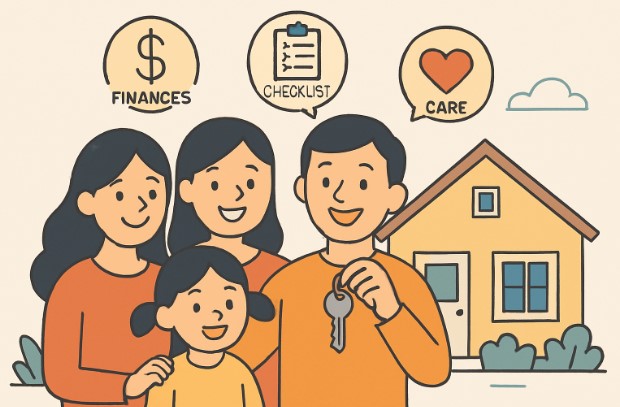Embarking on the journey to homeownership is both exciting and challenging. For those taking their first steps into the property market, becoming informed and prepared can transform an overwhelming process into a confident experience. Whether you’re eager to browse homes for sale in Wayland or explore neighborhoods further afield, understanding the essentials is key to making sound decisions and achieving your dream of owning a home.
There are numerous steps between dreaming about your perfect home and receiving the keys. Knowing how to assess your finances, secure pre-approval, and navigate inspections or closing costs ensures a smoother path to homeownership. By investing the time to learn each stage, you’ll reduce stress and increase your chances of long-term satisfaction in your new space.
Assess Your Financial Health
The most critical first step is to get a clear picture of your overall financial situation. Calculate your monthly income, list all debts, and review your current expenses, including rent, utilities, and recurring bills. Evaluating your credit score is especially important—it not only determines loan eligibility, but a higher score often means securing a lower interest rate, potentially saving thousands over the course of your mortgage. Many buyers find online resources such as the Consumer Financial Protection Bureau’s guide to buying a house helpful for understanding mortgage readiness and budgeting.
Once you have a complete view of your finances, you can set practical savings targets and create a timeline for purchasing a home. In addition, pinpointing areas where you can cut expenses or reduce debt early will improve your financial standing and increase your likelihood of mortgage approval.
Establish a Realistic Budget
Once you understand your finances, it’s time to set your price range. Experts recommend housing costs stay within 31–40% of your gross monthly income, accounting for property taxes, insurance, repairs, and, when applicable, homeowners association fees. Be realistic about ongoing maintenance, utility costs, and the potential for unexpected repairs. Setting reasonable boundaries upfront guards against stretching your financial resources too thin and keeps stress levels down as you shop for a home.
Obtain Mortgage Pre-Approval
Getting pre-approved for a mortgage is an essential milestone. This process requires submitting detailed financial documents to a lender for review. With pre-approval, you know how much you can borrow, and sellers will see you as a committed, well-qualified buyer. Pre-approval can be a decisive factor in competitive markets where multiple offers are common, as it demonstrates your readiness to proceed and can expedite the closing timeline.
Explore Down Payment Assistance Programs
Saving for a down payment can take years, particularly for first-time buyers. Fortunately, a variety of down payment assistance programs—offered by federal, state, and local agencies—can make homeownership more attainable. These often come in the form of grants, forgivable second mortgages, or tax credits for qualifying buyers. It’s worth researching extensively and applying early, as competition for funds can be significant.
Choose the Right Real Estate Agent
Having a trustworthy local real estate agent in your corner is invaluable through every step. An experienced agent can offer valuable insights into neighborhoods, market trends, and effective price negotiation strategies. They act as your advocate in a sometimes-complex transaction, helping you understand which properties fit your needs and budget. For tips on selecting the right professional for your situation, Better Homes & Gardens offers a helpful guide on how to pick a real estate agent. Seek out agents who are familiar with your target communities and have a track record of successfully helping first-time buyers find their homes.
Conduct Thorough Home Inspections
Once you find a property you like, schedule a comprehensive inspection—this is your safeguard against hidden issues and future headaches. Licensed inspectors will investigate the most critical components of a home, including the roof, foundation, electrical, plumbing, and HVAC systems. It is wise to attend the inspection if possible, allowing you to ask questions and gain firsthand insights into the property’s condition. Addressing issues before closing puts you in a stronger negotiating position and reduces surprise costs after move-in.
Be Prepared for Closing Costs
In addition to your down payment, factor in closing costs, typically ranging from 2% to 5% of the final purchase price. These encompass lender fees, inspections, title insurance, taxes, and attorney charges. Request a loan estimate from your lender early for a clearer picture. Budgeting for these expenses is crucial so you’re not caught off guard at the final stages of your purchase.
Stay Patient and Flexible
Finally, patience is vital during the home-buying process. The path from house hunting to closing can be unpredictable—homes may sell quickly or negotiations might not go as planned. Stay flexible on location, property style, or timing, and be open to adjusting your criteria. Keeping an adaptable mindset and having backup options ensures you’re more likely to find a property that meets your needs without unnecessary pressure or compromise.
First-time home buying is a journey that rewards patience, diligence, and a thorough understanding of the process. By leveraging these tips and resources, you’ll be prepared to navigate the process with confidence, make informed decisions, and set the foundation for long-term happiness in your new home.

